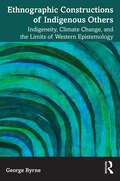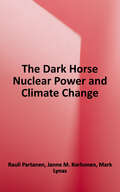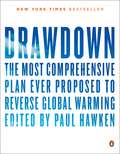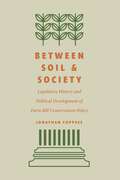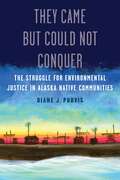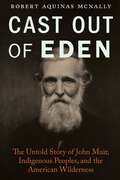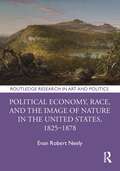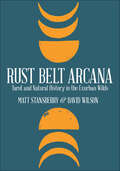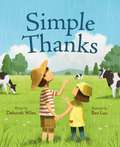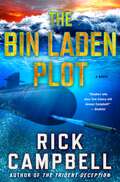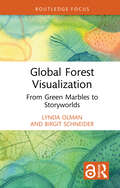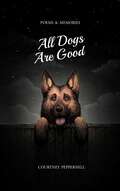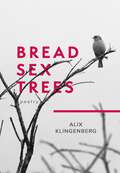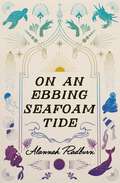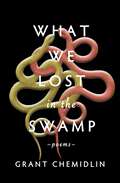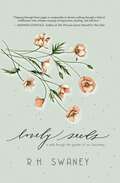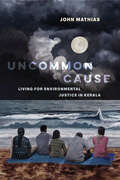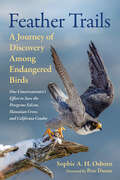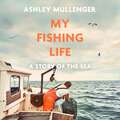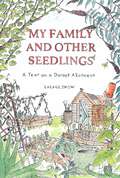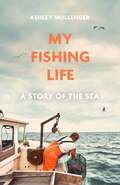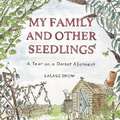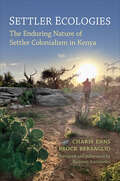- Table View
- List View
Ethnographic Constructions of Indigenous Others: Indigeneity, Climate Change, and the Limits of Western Epistemology
by George ByrneThis book examines the ways in which indigeneity interacts with climate change politics at multiple levels and at the same time offers a self-critical reflection on the role of ethnographic research (and researchers) in this process. Through a multi-sited ethnography, it shows how indigeneity and climate change mitigation are at this point so intensely intertwined that one cannot be clearly understood without considering the other. While indigenous identities have been (re)defined in relation to climate change, it argues that Indigenous Peoples continue to subvert pervasive notions of the nature/culture dichotomy and disrupt our understanding of what it means to be human in relation to nature. It encourages students and researchers in anthropology, international development, and other related fields to engage in more meaningful reflection on the epistemic shortcomings of “the West”, including in our own research, and to acknowledge the ongoing role of power, coloniality, extractivism, and whiteness in climate change discourses.
The Dark Horse: Nuclear Power and Climate Change
by Rauli Partanen Janne M. KorhonenClimate scientists consider climate change to be among top threats to humanity’s future. If unchecked, runaway climate change can destroy not just many of our current ecosystems, but wreak havoc in human societies as well. To prevent the worst catastrophe, greenhouse gas emissions from our energy system needs to decline to zero rapidly. We need to replace fossil fuels, which represent roughly 85 % of our energy production, with low-carbon alternatives. To manage this in a low-risk and timely manner, all tools need to be utilized to their maximum potential, including nuclear energy. Nuclear is surrounded by colourful rhetoric, politics, fear and fearmongering, click-bait scandal-headlines and mental images of dangerous radiation and catastrophic accidents. But how much of this is warranted, and how much is based on beliefs, opinions and prejudices? How dangerous is ionizing radiation really? What happened in Chernobyl and Fukushima, and what are the best estimates on their effects on public health and the environment? And can we harness nuclear energy to play a major role in decarbonizing our energy systems rapidly and more affordably? This book takes a serious look how the climate change mitigation is progressing, what needs to be done, and how nuclear has helped in the past, and can help us in the future. Partanen is an award-winning science writer and analyst on climate, environment, energy and society. Korhonen did his PhD in the history of technology, has written about climate and energy for years and is currently researching “Plan B”, an emergency program for climate change mitigation.
Drawdown: The Most Comprehensive Plan Ever Proposed to Reverse Global Warming
by Edited by Paul Hawken• New York Times bestseller •The 100 most substantive solutions to reverse global warming, based on meticulous research by leading scientists and policymakers around the world&“At this point in time, the Drawdown book is exactly what is needed; a credible, conservative solution-by-solution narrative that we can do it. Reading it is an effective inoculation against the widespread perception of doom that humanity cannot and will not solve the climate crisis. Reported by-effects include increased determination and a sense of grounded hope.&” —Per Espen Stoknes, Author, What We Think About When We Try Not To Think About Global Warming &“There&’s been no real way for ordinary people to get an understanding of what they can do and what impact it can have. There remains no single, comprehensive, reliable compendium of carbon-reduction solutions across sectors. At least until now. . . . The public is hungry for this kind of practical wisdom.&” —David Roberts, Vox&“This is the ideal environmental sciences textbook—only it is too interesting and inspiring to be called a textbook.&” —Peter Kareiva, Director of the Institute of the Environment and Sustainability, UCLAIn the face of widespread fear and apathy, an international coalition of researchers, professionals, and scientists have come together to offer a set of realistic and bold solutions to climate change. One hundred techniques and practices are described here—some are well known; some you may have never heard of. They range from clean energy to educating girls in lower-income countries to land use practices that pull carbon out of the air. The solutions exist, are economically viable, and communities throughout the world are currently enacting them with skill and determination. If deployed collectively on a global scale over the next thirty years, they represent a credible path forward, not just to slow the earth&’s warming but to reach drawdown, that point in time when greenhouse gases in the atmosphere peak and begin to decline. These measures promise cascading benefits to human health, security, prosperity, and well-being—giving us every reason to see this planetary crisis as an opportunity to create a just and livable world.
Between Soil and Society: Legislative History and Political Development of Farm Bill Conservation Policy
by Jonathan CoppessThe United States spends approximately $5 billion each year on federal programs designed to conserve natural resources and address the environmental consequences of modern agricultural production. Like farm policy, agricultural conservation policy is rooted in the Roosevelt administration&’s New Deal efforts of the 1930s. Farm conservation policy has waxed and waned since then, related to fluctuating economic and environmental concerns. In Between Soil and Society Jonathan Coppess traces the history and development of U.S. conservation policy, especially as it compares to and interacts with the development of farm policy. By answering questions about the differences in political support and development for these similar policy regimes, with efforts to apply legal and political theory to understand the differences, Coppess considers the implications of climate change and lessons for future policy development. One of the few books to make sense of the legal and economic analysis of agricultural conservation policy, Between Soil and Society provides a window into larger issues of American politics, governance, and policy development.
They Came but Could Not Conquer: The Struggle for Environmental Justice in Alaska Native Communities
by Diane J. PurvisAs the environmental justice movement slowly builds momentum, Diane J. Purvis highlights the work of Indigenous peoples in Alaska&’s small rural villages, who have faced incredible odds throughout history yet have built political clout fueled by vigorous common cause in defense of their homes and livelihood. Starting with the transition from Russian to American occupation of Alaska, Alaska Natives have battled with oil and gas corporations; fought against U.S. plans to explode thermonuclear bombs on the edge of Native villages; litigated against political plans to flood Native homes; sought recompense for the Exxon Valdez oil spill disaster; and struggled against the federal government&’s fishing restrictions that altered Native paths for subsistence. In They Came but Could Not Conquer Purvis presents twelve environmental crises that occurred when isolated villages were threatened by a governmental monolith or big business. In each, Native peoples rallied together to protect their land, waters, resources, and a way of life against the bulldozer of unwanted, often dangerous alterations labeled as progress. In this gripping narrative Purvis shares the inspiring stories of those who possessed little influence over big business and regulations yet were able to protect their traditional lands and waterways anyway.
Cast Out of Eden: The Untold Story of John Muir, Indigenous Peoples, and the American Wilderness
by Robert Aquinas McNallyJohn Muir is widely and rightly lauded as the nature mystic who added wilderness to the United States&’ vision of itself, largely through the system of national parks and wild areas his writings and public advocacy helped create. That vision, however, came at a cost: the conquest and dispossession of the tribal peoples who had inhabited and managed those same lands, in many cases for millennia. Muir argued for the preservation of wild sanctuaries that would offer spiritual enlightenment to the conquerors, not to the conquered Indigenous peoples who had once lived there. &“Somehow,&” he wrote, &“they seemed to have no right place in the landscape.&”Cast Out of Eden tells this neglected part of Muir&’s story—from Lowland Scotland and the Wisconsin frontier to the Sierra Nevada&’s granite heights and Alaska&’s glacial fjords—and his take on the tribal nations he encountered and embrace of an ethos that forced those tribes from their homelands. Although Muir questioned and worked against Euro-Americans&’ distrust of wild spaces and deep-seated desire to tame and exploit them, his view excluded Native Americans as fallen peoples who stained the wilderness&’s pristine sanctity. Fortunately, in a transformation that a resurrected and updated Muir might approve, this long-standing injustice is beginning to be undone, as Indigenous nations and the federal government work together to ensure that quintessentially American lands from Bears Ears to Yosemite serve all Americans equally.
Political Economy, Race, and the Image of Nature in the United States, 1825–1878 (Routledge Research in Art and Politics)
by Evan Robert NeelyPolitical Economy, Race, and the Image of Nature in the United States, 1825–1878 is an interdisciplinary work analyzing the historical origins of a dominant concept of Nature in the culture of the United States during the period of its expansion across the continent.Chapters analyze the ways in which “Nature” became a discursive site where theories of race and belonging, adaptation and environment, and the uses of literary and pictorial representation were being renegotiated, forming the basis for an ideal of the human and the nonhuman world that is still with us. Through an interdisciplinary approach involving the fields of visual culture, political economy, histories of racial identity, and ecocritical studies, the book examines the work of seminal figures in a variety of literary and artistic disciplines and puts the visual culture of the United States at the center of intellectual trends that have enormous implications for contemporary cultural practice.The book will be of interest to scholars working in art history, visual culture, American studies, environmental studies/ecocriticism, critical race theory, and semiotics.
Rust Belt Arcana: Tarot and Natural History in the Exurban Wilds
by Matt Stansberry David WilsonAn insightful take on the Tarot through the lens of the industrial Midwest, and a beautiful piece of nature writing in its own right. What can the Tarot tell us about the flora and fauna of the industrial Midwest? In what ways might this ancient practice connect us to the Rust Belt today? Rust Belt Arcana uses the Tarot’s time-tested structure to answer these questions, juxtaposing the characteristics of the cards with the creatures and plants that surround us every day. The 22 idiosyncratic essays here—one for every card in the Major Arcana—bridge biology, natural history, and the human condition. They tell stories of abundance and loss, and they remind us of the Rust Belt’s persistent remnant wilderness, a landscape often dismissed as unremarkable. A magical book both for Tarot enthusiasts and for those who are seeking to see beauty in a beleaguered landscape and define their remarkable place within it.
Simple Thanks
by Deborah WilesFrom award-winning author Deborah Wiles and illustrator Bao Luu comes an exuberant and heartwarming picture book tribute to the things that connect us all—nature, love, and gratitude. I hear the song that nature singsthat links each heart to mine.The ocean blue, the sky abovethe forest with its pine.For a young brother and sister, every day spent in nature is an adventure, and every natural marvel they encounter is a gift. Together, they run through fields of tall grass and say thank you for the rain; they greet fish in babbling brooks and say thank you for the clear blue waters. At the end of each adventure, they say thank you for the new friends they collected along the way.When given a chance to do more than say thank you, the siblings gather their tools—their friends, their shovels, and their watering cans—and plant the seeds of gratitude.
The Bin Laden Plot: A Novel (Trident Deception Series #7)
by Rick CampbellA U.S. destroyer is torpedoed by an Iranian submarine and Captain Murray Wilson of the U.S.S. Michigan is flown to the Pentagon to meet with the Secretary of the Navy (SecNav). There Wilson learns that the Iranian submarine is just a cover story. One of the United States' own fully automated unmanned underwater vehicles has gone rogue, its programming corrupted in some way. Murray is charged with hunting it down and taking it out before the virus that's infected its operating system can infect the rest of the fleet. At the same time, the head of the SEAL detachment aboard the U.S.S Michigan is killed and Lonnie Mixell, a former U.S. operative, now assassin for hire, is responsible. And that is only the first SEAL to be hunted down and killed. Jake Harrison, fellow SEAL, discovers that these SEALs had one mission in common - they were all on the team that killed Bin Laden. Or so the world was told. As Wilson discovers that his mission is actually meant to cover up dangerous acts of corruption, even treason, Harrison discovers that the assassin is out to protect the same forces. Forces too powerful for either of them to take on alone.
Global Forest Visualization: From Green Marbles to Storyworlds (Routledge Focus on Environment and Sustainability)
by Lynda Olman Birgit SchneiderThis book project examines global forest monitoring as a means to understand the promises and problems of global visualization for climate management.Specifically, the book focuses on Global Forest Watch, the most developed and widely available forest-monitoring platform, created in 1997 by the World Resource Institute. Forest maps are always political as they visualize power relations and form the grid within which forests become commodities. This dislocation of the idea of the forest from its literal roots in the ground has generated problems for forest visualization efforts designed to empower local communities. This book takes a critical humanistic approach to this problem, combining methods from the fields of rhetoric and media studies to suggest solutions to these problems for designers and users of platforms like the Global Forest Watch. To explain why global views of forests can be disempowering, the book relies on biopolitical and rhetorical theories of panopticism and how these views unfold a different violence on different regions of the Earth in relation to colonial history. Using this theoretical framework, the book explains the historical process by which forests came to be classified, quantified, and mapped on a global scale. Interviews with end-users of global forest visualization platforms reveal if and how these platforms support local action. Lastly, the book provides rhetorical solutions to articulate global and local views of forests without reducing one view to the other. These solutions involve looking to forests themselves for clues about how to generate more broadly effective and resilient visualizations.This book will be of great interest to students and scholars of forest studies, climate change, science communication, visualization studies, environmental communication, and environmental conservation.The Open Access version of this book, available at http://www.taylorfrancis.com, has been made available under a Creative Commons [Attribution-Non Commercial-No Derivatives (CC-BY-NC-ND)] 4.0 license.
All Dogs Are Good: Poems & Memories
by Courtney PeppernellWritten for anyone who has known the touch of a cold nose on their hand, the bark of a best friend, or the joy of a walk accompanied by a wagging tail, All Dogs Are Good pays tribute to the special bond we share with our canine companions.Filled with heartfelt poems and prose on the love, dedication, and laughter our dogs bring, as well as the unique lessons they teach us along the way, bestselling author Courtney Peppernell&’s vignettes of life with our dogs are a touching reminder of the gifts they give us during their journey on earth. Celebrating dogs everywhere, All Dogs Are Good is a collection dog lovers will hold in their hearts forever.
Bread Sex Trees: Poetry
by Alix KlingenbergBread Sex Trees is a poetic invocation, a call to the dreamers, the visionaries, the alchemists, to those who live in rhythm with the seasons and the land, those who are healing, and for everyone who is reclaiming their creative power. From Alix Klingenberg, a popular creator and poet, this collection offers wisdom, beauty, and a road map to self-love that doesn&’t bypass life&’s inevitable challenges.
On an Ebbing Seafoam Tide
by Alannah RadburnLove, loss, witchcraft, avocado toast, and storming the patriarchy: On an Ebbing Seafoam Tide is an inclusive poetic perspective on millennial life. Love, loss, witchcraft, avocado toast, and storming the patriarchy: an inclusive poetic perspective on millennial life. The ocean is one of the greatest metaphors: the ebb and flow of love and loss, the tumultuous emotions that roil beneath a blue-calm surface, the search for meaning in the endless horizons of sea and sky. On an Ebbing Seafoam Tide is a deep dive into reflections on the calms and tempests of everyday life.Alannah Radburn&’s poetry floats to the surface amidst the messy chaos of personal relationships and societal constructs, and comes together in a relatable perfect storm of practical wisdom. If you&’ve ever felt like you were drowning in feelings or searching to find meaning in today&’s turbulent times, you will find a lifeline in these poems.
What We Lost in the Swamp: Poems
by Grant ChemidlinHow do you untangle the real you from the curated you? In this introspective yet whimsical collection, poet Grant Chemidlin takes readers into the thicket of self-discovery.**Finalist for Lambda Literary Award - Gay Poetry What We Lost in the Swamp is a lush and vibrant collection of poems that examines the many manifestations of green: nature, inexperience, jealousy, burgeoning love, and exploring sexuality. It is a slow unfurling. It is a love letter to growth, to rediscovery, to finally learning how to speak the truth. These astonishing poems ask the reader: Who do you want to be in this world? How do you want to build a life? This is not a coming out. This is a coming in to one&’s truest self.Find out why this is one of TikTok's most viral poetry books.
Lovely Seeds: A Walk Through the Garden of Our Becoming
by R. H. Swaney&“Explores the beauty that can be found in even the most hopeless of situations.&”—Cyrus Parker, author of DROPKICKromance&“Every page is a gentle reminder to take care of yourself. Lovely Seeds will help you be ok with being you.&”—Iain S. Thomas, author of I Wrote This For YouR. H. Swaney brings a depolarizing voice to the poetry world with this debut collection. Amongst the topics of mental health, self-love, and social progress, readers will find a soft but powerful voice that uncovers the beauty that exists inside of all of us.Examining life and its circle from seed to withering to regrowth, the thought-provoking nature of this collection will bring readers to a place of self-exploration, reflection, and a deeper understanding of their place in the world.
Uncommon Cause: Living for Environmental Justice in Kerala
by John MathiasHow can activists strike a balance between fighting for a cause and sustaining relationships with family, friends, and neighbors? Uncommon Cause follows environmental justice activists in Kerala, India, as they seek out, avoid, or strive to overcome conflicts between their causes and their community ties. John Mathias finds two contrasting approaches, each offering distinct possibilities for an activist life. One set of activists repudiates community ties and resists normative pressures; for them, environmental justice becomes a way of transcending all local identities and affiliations, even humanity itself. Other activists seek to ground their activism in community belonging, to fight for their own people. Each approach produces its own dilemmas and offers its own insights into ethical tensions we all face between taking a stand and standing with others. In sharing Kerala activists’ diverse stories, Uncommon Cause offers a fresh perspective on environmental ethics, showing that environmentalism, even as it looks beyond merely human concerns, is still fundamentally about how we relate to other people.
Feather Trails: A Journey of Discovery Among Endangered Birds
by Sophie A. OsbornThe story of one woman’s remarkable work with a trio of charismatic, endangered bird species—and her discoveries about the devastating threats that imperil them. In Feather Trails, wildlife biologist and birder Sophie A. H. Osborn reveals how the harmful environmental choices we’ve made—including pesticide use, the introduction of invasive species, lead poisoning, and habitat destruction—have decimated Peregrine Falcons, Hawaiian Crows, and California Condors. In the Rocky Mountains, the cloud forests of Hawai’i, and the Grand Canyon, Sophie and her colleagues work day-to-day to try to reintroduce these birds to the wild, even when it seems that the odds are steeply stacked against their survival. With humor and suspense, Feather Trails introduces us to the fascinating behaviors and unique personalities of Sophie’s avian charges and shows that what endangers them ultimately threatens all life on our planet. More than a deeply researched environmental investigation, Feather Trails is also a personal journey and human story, in which Sophie overcomes her own obstacles—among them heat exhaustion, poachers, rattlesnakes, and chauvinism. Ultimately, Feather Trails is an inspiring, poignant narrative about endangered birds and how our choices can help to ensure a future not only for the rarest species, but for us too. "An intimate look at the wonder and effort needed for working with endangered species in the wild. [Osborn's] matter-of-fact writing style and wry humor make the reader part of the action."—Booklist (starred review)
My Fishing Life: A Story of the Sea
by Ashley Mullenger'A beautiful, heartfelt love letter to the sea, and a cherished industry. Ash is a force of nature, she's a testament to working hard and dreaming big' Dermot O'LearyAshley Mullenger had never planned to become a fisherman. A chance fishing trip - catching mackerel off the Norfolk coast - was the start of an obsession. One that resulted in a transformation from clean-cut office worker to commercial 'Fisherman of the Year', and proud working owner of two boats, Fairlass and Saoirse, alongside skipper Nigel.This is a memoir of that journey, a life swept up in tides and elements, strength of mind and body, of old ways and new struggles. It's about the bravery of crews, early mornings, weather-beaten characters and those that can sink pints as fast as they can haul pots. These coastal communities and age-old livelihoods are built on trust, courage and skill - but they are also fraying against politics, poverty and climate change. The reality of commercial fishing is rarely seen, but Ashley carries us across the waves and around the UK's waters in vivid detail to show what is really happening at sea to land the fish on our plates.My Fishing Life is both a rallying cry and a love letter, rinsed down with salty humour, to an industry often misunderstood. One woman's unique story of boat, skipper, sea and catch ultimately becomes a transformative view of a world that impacts deeply on us all.
My Family and Other Seedlings: A Year on a Dorset Allotment
by Lalage SnowA few years ago Lally Snow moved to a Dorset village with her husband and three small children, having spent over a decade as a war photographer, foreign correspondent and film maker living in Kabul. She covered the conflict there as well as other wars from Gaza to Eastern Ukraine, and Iraq.In the late winter of 2021-22, Lally decided to rent an allotment, despite having only a rudimentary knowledge of gardening. She was starting from scratch and setting herself the dual challenge of growing an allotment at the same time as growing a family.This is a heart-warming, wry and at times tearful account of Lally's travails as a mother and novice allotment holder, counterpointing horticultural progress with the perils of parenting. Along the way she reflects on the drudgery of English rural domesticity after a professional life chasing war and adventure, the history of the allotment since Saxon times, and the wonderful moment when gardening becomes fun rather than just feeding a family.
My Family and Other Seedlings: A Year on a Dorset Allotment
by Lalage SnowA few years ago Lally Snow moved to a Dorset village with her husband and three small children, having spent over a decade as a war photographer, foreign correspondent and film maker living in Kabul. She covered the conflict there as well as other wars from Gaza to Eastern Ukraine, and Iraq.In the late winter of 2021-22, Lally decided to rent an allotment, despite having only a rudimentary knowledge of gardening. She was starting from scratch and setting herself the dual challenge of growing an allotment at the same time as growing a family.This is a heart-warming, wry and at times tearful account of Lally's travails as a mother and novice allotment holder, counterpointing horticultural progress with the perils of parenting. Along the way she reflects on the drudgery of English rural domesticity after a professional life chasing war and adventure, the history of the allotment since Saxon times, and the wonderful moment when gardening becomes fun rather than just feeding a family.
My Fishing Life: A Story of the Sea
by Ashley Mullenger'A beautiful, heartfelt love letter to the sea, and a cherished industry. Ash is a force of nature, she's a testament to working hard and dreaming big' Dermot O'LearyAshley Mullenger had never planned to become a fisherman. A chance fishing trip - catching mackerel off the Norfolk coast - was the start of an obsession. One that resulted in a transformation from clean-cut office worker to commercial 'Fisherman of the Year', and proud working owner of two boats, Fairlass and Saoirse, alongside skipper Nigel.This is a memoir of that journey, a life swept up in tides and elements, strength of mind and body, of old ways and new struggles. It's about the bravery of crews, early mornings, weather-beaten characters and those that can sink pints as fast as they can haul pots. These coastal communities and age-old livelihoods are built on trust, courage and skill - but they are also fraying against politics, poverty and climate change. The reality of commercial fishing is rarely seen, but Ashley carries us across the waves and around the UK's waters in vivid detail to show what is really happening at sea to land the fish on our plates.My Fishing Life is both a rallying cry and a love letter, rinsed down with salty humour, to an industry often misunderstood. One woman's unique story of boat, skipper, sea and catch ultimately becomes a transformative view of a world that impacts deeply on us all.
My Family and Other Seedlings: A Year on a Dorset Allotment
by Lalage SnowA few years ago Lally Snow moved to a Dorset village with her husband and three small children, having spent over a decade as a war photographer, foreign correspondent and film maker living in Kabul. She covered the conflict there as well as other wars from Gaza to Eastern Ukraine, and Iraq.In the late winter of 2021-22, Lally decided to rent an allotment, despite having only a rudimentary knowledge of gardening. She was starting from scratch and setting herself the dual challenge of growing an allotment at the same time as growing a family.This is a heart-warming, wry and at times tearful account of Lally's travails as a mother and novice allotment holder, counterpointing horticultural progress with the perils of parenting. Along the way she reflects on the drudgery of English rural domesticity after a professional life chasing war and adventure, the history of the allotment since Saxon times, and the wonderful moment when gardening becomes fun rather than just feeding a family.
My Fishing Life: A Story of the Sea
by Ashley Mullenger'A beautiful, heartfelt love letter to the sea, and a cherished industry. Ash is a force of nature, she's a testament to working hard and dreaming big' Dermot O'LearyAshley Mullenger had never planned to become a fisherman. A chance fishing trip - catching mackerel off the Norfolk coast - was the start of an obsession. One that resulted in a transformation from clean-cut office worker to commercial 'Fisherman of the Year', and proud working owner of two boats, Fairlass and Saoirse, alongside skipper Nigel.This is a memoir of that journey, a life swept up in tides and elements, strength of mind and body, of old ways and new struggles. It's about the bravery of crews, early mornings, weather-beaten characters and those that can sink pints as fast as they can haul pots. These coastal communities and age-old livelihoods are built on trust, courage and skill - but they are also fraying against politics, poverty and climate change. The reality of commercial fishing is rarely seen, but Ashley carries us across the waves and around the UK's waters in vivid detail to show what is really happening at sea to land the fish on our plates.My Fishing Life is both a rallying cry and a love letter, rinsed down with salty humour, to an industry often misunderstood. One woman's unique story of boat, skipper, sea and catch ultimately becomes a transformative view of a world that impacts deeply on us all.
Settler Ecologies: The Enduring Nature of Settler Colonialism in Kenya
by Charis Enns Brock BersaglioSettler Ecologies tells the story of how settler colonialism becomes memorialized and lives on through ecological relations. Drawing on eight years of research in Laikipia, Kenya, Charis Enns and Brock Bersaglio use immersive methods to reveal how animals and plants can be enrolled in the reproduction of settler colonialism. The book details how ecological relations have been unmade and remade to enable settler colonialism to endure as a structure in this part of Kenya. It describes five modes of violent ecological transformation used to prolong structures of settler colonialism: eliminating undesired wild species; rewilding landscapes with more desirable species to settler ecologists; selectively repeopling wilderness to create seemingly more inclusive wild spaces and capitalize on biocultural diversity; rescuing injured animals and species at risk of extinction to shore up moral support for settler ecologies; and extending settler ecologies through landscape approaches to conservation that scale wild spaces. Settler Ecologies serves as a cautionary tale for future conservation agendas in all settler colonies. While urgent action is needed to halt global biodiversity loss, this book underscores the need to continually question whether the types of nature being preserved advance settler colonial structures or create conditions in which ecologies can otherwise be (re)made and flourish.
